#korean langauge blog
Explore tagged Tumblr posts
Text
December 8th, 2024
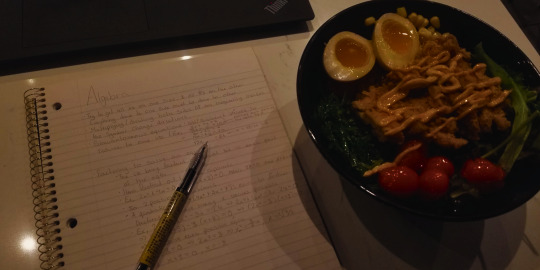
Studying for the GMAT day 8/150
I spent a few hours at a board game cafe I've been frequenting lately- the decorations are absolutely beautiful and they have a massive collection of games. It's not a place I would expect to be frequenting as I'm not a huge fan of the coffee and the food is a bit overpriced for what it is, but the environment is genuinely so heartwarming and all the employees are sweet. Today's been a productive day and I've gotten so much more than I thought I would do. My brains fried though I just did my skin care routine twice today.
What I did today:
Data visualization unit of the online GMAT math review course
Princeton Review: went back and re-wrote my algebra notes, to make sure I can memorize it better
Completed some online examples about substituting equations and factoring
Completed one more section of the data visualization course that I have been putting off
FINALLY completed that yfinance python API project
Completed one python LeetCode question
Finished up my current unit on an Azure course
Playlist for the day:
youtube
I know the GMAT has a lot more than math, however math is the only thing I've really truly struggled with and that I know I would procrastinate if I were to start with other things. So, I've started with math as I'm most likely to give up on it and wanted to tackle the hardest thing first so I have something to look forward to.
#study blog#studyspo#daily journal#studyblr#study motivation#dark academia#light academia#to do list#coding#langauge learning#cafe aesthetic#coffee shop#korean food#study aesthetic#chaotic academia#it girl self care#it girl energy
12 notes
·
View notes
Text
Studying Korean 101: Vowels
Korean Alphabet is called Hangul
Hangul has 24 basic letters (10 basic vowels / 14 basic consonants)
***When learning Hangul with the romanized pronunciation just remember to check online sources (w/ audio clips preferably) when navigating new words and sounds.
- romanization will be in bold -
All vowels written are written with ㅇ but when writing the alphabet the ㅇ is not necessary. A vowel cannot be by itself and has to have a consonant accompany it to form words, phrases, and sentences. ㅏ is usually written as 아 to express the base sound of the vowel. Any other consonant adds a secondary sound.
The vowels in Korean can be separated into categories: simple vowel, double vowel, compound vowel, and complex vowel. With subcategories of positive, negative, and neutral.
Simple vowels are vowels with one and distinct sound.
ㅏ - this vowel makes the sound ah (a)
ㅓ - this vowel makes the sound oh (eo)
ㅗ - this vowel makes the sound o (o)
ㅜ - this vowel makes the sound eww (u)
ㅡ - this vowel makes the sound euhh (eu)
ㅣ - this vowel makes the sound ee (i)
The difference between simple vowels and double vowels is the amount of lines. ㅏ & ㅑ are technically the same sound (a sound) while the double line adds a y sound to the letter. Some scholars believe ㅑ comes from ㅏ+ㅏ. Think of double vowels as the two legged/armed version of the simple vowels. Like in English when I is written we can change it to Y by adding an arm.
Double vowels are simple vowels with a y sound attached to the beginning of the sound.
ㅑ - this vowel makes the sound yah (ya) ㅏ + ㅏ
ㅕ - this vowel makes the sound yoh (yeo) ㅓ + ㅓ
ㅛ - this vowel makes the sound yo (yo) ㅗ + ㅗ
ㅠ - this vowel makes the sound yew (yu) ㅜ + ㅜ
Simple & Double vowels are the BASIC VOWELS of Hangul! These are the building blocks for all further vowels.
Compound vowels are vowels that combine two simple vowels OR one simple and one double vowel. When two vowel sounds combine, the sound is a mixture of the vowels strewn together. For example, ㅟ is ㅜ + ㅣ the sound is eww and ee together. Say it fast and close together the sound become wee (wi).
ㅐ - this vowel makes the sound aye (ae) ㅏ +ㅣ
ㅒ - this vowel makes the sound yay (yae) ㅑ + ㅣ
ㅔ - this vowel makes the sound eigh (e) ㅓ +ㅣ
ㅖ - this vowel makes the sound yeigh (ye) ㅕ+ ㅣ
ㅘ - this vowel makes the sound wah (wa) ㅗ +ㅏ
ㅚ - this vowel makes the sound way (oe) ㅗ + ㅣ
ㅝ - this vowel makes the sound woah (wo) ㅜ + ㅓ
ㅟ - this vowel makes the sound wee (wi) ㅜ + ㅣ
ㅢ - this vowel makes the sound oui (ui) ㅡ + ㅣ
Complex vowels are vowels that combine a compound vowel and a simple vowel.
ㅙ - this vowel makes the sound way (wae) ㅗ + ㅐ
ㅞ - this vowel makes the sound weigh (we) ㅜ + ㅔ
A lot of compound and complex vowels sound the same, so often times in speech they are said the same way. Although it is easier to not learn both vowels, one must learn all to fully comprehend the language.
The lack of difference in similar vowel sounds comes from multiple different factors (the war, the rising usage of Seoulite, and oversees growth of Korean language). These factors all have different influences but similar influences on the language. Which can be effective simmered down to ease of language without accents and varieties throughout the nation.
Only about 33% of the population can perfectly pronounce some of these harder vowels, so it’s okay if you can’t either!
Hangul Vowel Subcategories are Positive, Negative, and Neutral vowels are the tones of the vowel itself. These tones are what decide (mostly) the connotation of a word.
Positive vowels are vowels that point upwards or to the right (^ and >). These vowels include ㅗ,ㅑ, andㅏ.
Negative vowels are vowels that point downwards or to the left (\/ and <). These vowels include ㅜ, ㅓ, andㅔ.
Neutral vowels are vowels that do not point any direction. These vowels include ㅡ, ㅣ, and ㅢ.
While tone and connotation do not always matter in everyday conversation, the words we are speaking have been shaped by this method.
An example of this is in the onomatopoeias “똑똑” and “쿵쿵.” The first onomatopoeic phrase is the sound of someone knocking at the door. The second onomatopoeic phrase is the sound of hitting something with a fist. While similar, these two phrases mean vastly different things and carry vastly different connotations, due in part to the tone of the vowel.
However, we won’t explore this topic yet because it’s more complicated and nuanced.
3 notes
·
View notes
Text
Exploring Language Cultures in Different Countries: A LanguagJourney
Language is not just a means of communication; it is a reflection of a country's culture, history, and identity.
Each language carries its unique characteristics and nuances, making it a fascinating subject to explore.
In this blog post, we will delve into the language cultures of four diverse langauges: Korean, English, Japanese, Chinese
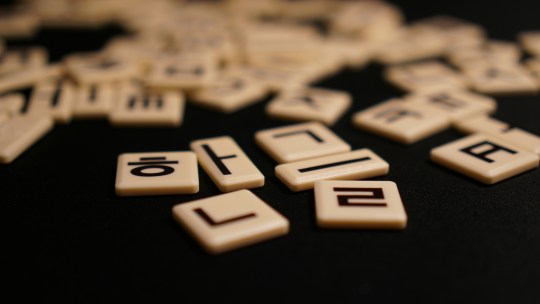
Korean Language:
Korean, the official language of South Korea and North Korea, is a language deeply rooted in history and tradition. The Korean writing system, known as Hangul, is renowned for its scientific design and simplicity.
Hangul consists of 14 consonants and 10 vowels, forming syllabic blocks that are arranged linearly. This unique writing system has played a significant role in preserving the Korean language and fostering a sense of national identity. The Korean language reflects the Confucian values and hierarchical structure of Korean society. Honorifics, known as "jondaetmal,"(honorific words for the elder) are an integral part of the language, used to show respect and maintain social harmony. The use of honorifics varies depending on the age, social status, and relationship between individuals.
Additionally, the Korean language is rich in onomatopoeic words, which vividly depict sounds and actions.
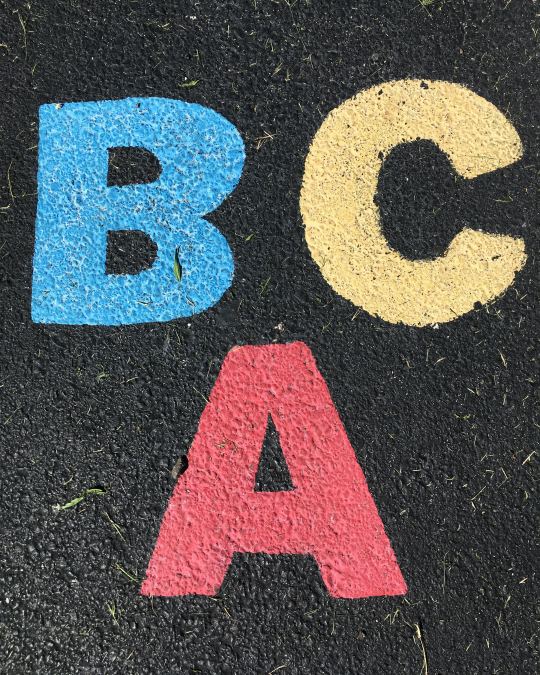
II. English Language:
The English language has evolved over centuries, influenced by various cultures and languages. From Old English to Middle English and Modern English, the language has undergone significant transformations, absorbing words and expressions from different regions and civilizations. English is known for its flexibility and adaptability, the language of business, science, and international communication.
English grammar, although complex, provides a framework for clear and concise expression.

III. Japanese Language:
The Japanese writing system consists of three scripts: Kanji, Hiragana, and Katakana.
Kanji, borrowed from Chinese characters, represents the meaning of words, while Hiragana and Katakana are phonetic scripts used for grammatical purposes and foreign words, respectively. The Japanese language is characterized by its politeness and respectfulness. Honorifics, known as "keigo," are an essential part of Japanese communication.
Additionally, the Japanese language is rich in expressions and idioms that reflect the country's unique cultural values, such as "omotenashi" (hospitality) and "wabi-sabi" (appreciation of imperfection).

IV. The Chinese Language:
A Treasure Trove of Characters and Tones The Chinese language, with its intricate writing system and tonal nature, is a linguistic marvel that has evolved over thousands of years.
Chinese characters, known as Hanzi, are pictographic symbols that represent words or concepts. Especially, Mandarin Chinese, the most widely spoken dialect, has four tones and a neutral tone. The tone of a word can completely change its meaning, adding an extra layer of complexity to the language. For example, the word "ma" can mean "mother," "hemp," "horse," or "scold" depending on the tone used. The Chinese language has gained global prominence due to China's economic growth and influence. Mandarin Chinese is now one of the most widely learned languages in the world, with millions of people studying it as a second language.
1 note
·
View note
Text
In Depth Body Vocab [pt. 2]
As promised, here’s PART TWO of the in depth body vocab! PART ONE covered the face / head. Today we will look at the back, torso, and most internal organs. Enjoy <3
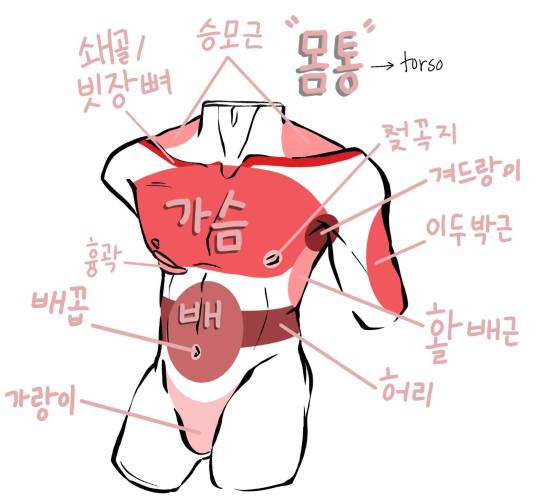
*picture is of a male presenting torso (necessary vocabulary is highlighted)
몸통 - torso
승모근 - traps
쇄골 / 빗장뼈 - collar bone
major difference between 쇄골 and 빗장뼈: Both can translate to the scientific name ‘clavicle’. However, 쇄골 comes from 한자: ‘鎖骨’.
흉�� - ribcage
가슴 - chest / breast
젖꼭지 - nipple
겨드랑이 - armpit
겨드랑이 털 - armpit hair
이드박근 - bicep
배 - belly, stomach (exterior)
배꼽 - bellybutton
활배근 - lats
허리 - waist
가랑이 - crotch
Example Sentences:
저는 겨드랑이에서 땀이 괴도하게 났었어요 - I used to sweat a lot in my armpits
밥을 많이 먹어서 배가 너무 불러요 - My stomach is full because I ate too much
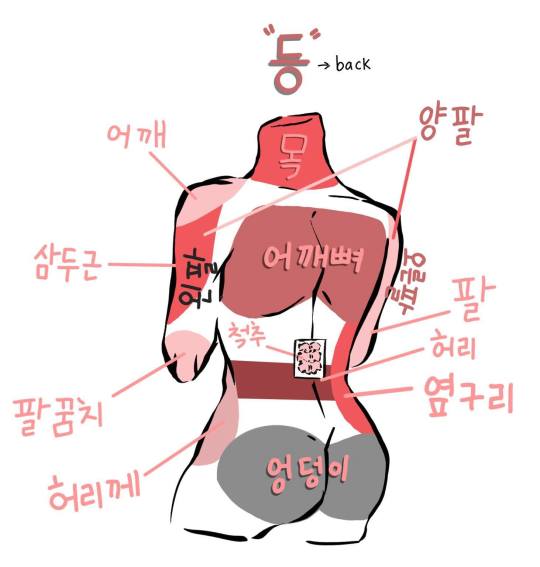
*blank back cut off at the legs and neck (necessary vocabulary is highlighted)
등 - back
목 - neck
어깨 - shoulder
팔 - arm
왼팔 - left arm
오른팔 - right arm
양팔 - both arms
삼두근 - triceps
팔꿈치 - elbow
척추 - spine
not to be confused with 척수 which refers to the spinal cord
허리 - waist
옆구리 - side
허리께 - hip
엉덩이 - butt / buttocks
Example Sentences:
양팔을 위로 줄 뻗어 보세요 - Please stretch your arms out
하루 종일 앉아 있었더니 엉덩이가 아파요 - My butt hurts from sitting on it all day
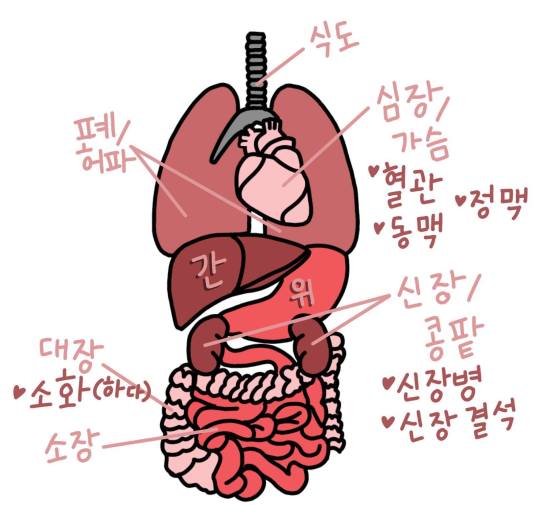
*picture of internal organs including the lungs, heart, liver, stomach, kidneys, and intestines (necessary vocabulary is highlighted)
장기 - organ
식도 - esophagus (’gullet’ in reference to animals)
폐 / 허파 - lung
major difference between 폐 and 허파: 폐 is used in more medical contexts over 허파
심장 / 가슴 - heart
major difference between 심장 and 가슴: 심장 refers to the literal pumping organ whereas 가슴 is the general area of the chest but can be used as an emotional heart (as opposed to 마음, which is the feeling in your heart)
혈관 - blood vessel
정맥 - vein
동맥 - artery
간 - liver
위 - stomach (internal)
신장 / 콩팥 - kidney
major difference between 신장 and 콩팥: 신장 comes from 한자: ‘腎臟’, where 콩팥 is the native Korean version.
신장병 - kidney disease
신장 결석 - kidney stone
장 - intestine
대장 - large intestine
소장 - small intestine
소화 (하다) - digestion (to digest)
혈액 / 피 - blood
major difference between 혈액 and 피: 혈액 is the medical form!
Example Sentences:
저는 수년간 위에 문제가 있어 왔어요 - I’ve had issues with my stomach for years
어젯밤 먹은 게 고화가 잘 안 돼요 - I’m having trouble digesting what I ate last night
Extra Vocab to Know:
배설(하다) - excretion (to excrete)
대변 / 똥 - stool or poop
major difference between 대변 and 똥: 대변 is more like feces whereas 똥 is much more casual in speech
소변 / 오줌 - urine or pee
major difference between 소변 / 오줌: same as above, 소변 is more like urine where 오줌 is more casual
both 소변 and 대변 come from 한자: 大便 (대변) and 小便 (소변)
싸다 - to poop/pee
누다 - to poop
음경 - penis
자궁 - womb
This is obviously for educational purposes, so I hope tumblr lets it stay up. But here’s PART TWO of the in depth body vocab!
Happy Learning :)
~ SK101
#korean#korean lang#korean language#korean lang blog#korean langblr#korean language blog#klangblr#kblr#korean blog#korean langauge blog#language blog#langblr#body vocabulary#korean body#korean vocabulary#korean body vocabulary#learn korean#studykorean#studykorean101#study korean#한국어 배우기#한국어 공부하기#한국어 공부해#한국어#한국#한국어 어휘#한국어 몸 어휘#한국어 문법#한국어 몸#몸 어휘
555 notes
·
View notes
Text
Hola!
I’m Em, welcome to my new blog.
This will basically just consist of posts about language learning, but I’m also open to questions about my journey and language learning in general.
Languages I’m currently learning:
- Spanish/Español
I’ve been learning Spanish in school for 3 and a half years. If I’m being honest, I only began taking it because I felt it would help me in the future when applying to colleges. However, recently I started taking my learning more seriously, so I’ve been reviewing and such. I don’t understand really anything I should understand, but I will eventually. 🙏
- Korean/한국어
I’ve been self-studying Korean off and on since December 2022. I’m really into K-pop, K-dramas and Korean culture. I’m hoping to visit Korea when I graduate. It’s crazy but I understand more Korean than I do Spanish… 😅 I find Korean really fun and really easy (at least for now…) and I can’t wait to progress!
Anyway, that’s pretty much it. Thank you if you read through all of that, and thank you even more if you follow my journey!
If you have any questions or requests for posts, please feel free to send them!
안녕!! ^^
#language#korean#spanish#langblr#kpopidol#kpop gg#kpop bg#espanol#한국어공부#한글#studywithme#study hard#studyblr#study blog#languages#langauge learning#bilinguist#bilingual#trilingual#polyglot#thai singer#spanish music#korean langblr#spanish langblr#spanish language#korean language
7 notes
·
View notes
Text
𝕔𝕙𝕚𝕟𝕖𝕤𝕖 𝕝𝕖𝕒𝕣𝕟𝕚𝕟𝕘 𝕣𝕖𝕤𝕠𝕦𝕣𝕔𝕖𝕤
here is a list of some really helpful mandarin resources that i found recently! all of the underlined ones are live links :)

chinese-grammar: i’m gonna be honest here, this grammar website is IMPRESSIVE. it provides 22 lessons and an extensive and detailed explanation of chinese script and characters (with a really long list of characters). i only just recently came across this website but i totally see myself using this, like, all the time. i highly highly highly recommend it!
chineseboost : this website is definitely an awesome long-term resource! it provides lessons for pretty much all levels of chinese (a1-c1, hsk1-hsk5) so everything is in one place! it also has some super helpful tools such as as a hanzi to pinyin translator and a blog where they have tips and study strategies!
LTL mandarin school : although the posts on this blog are a little limited, i feel like the posts that they do have are pretty helpful, especially their “complete guides” to basic chinese grammar! this is definitely not a primary resource, but since it has some helpful stuff i decided to include it :)
HSK 1: i find myself coming back again and again to this app! it’s a super super accessible resources and really interesting as a beginner chinese learner since it kind of throws you in the deep-end with its built-in games, and it’s honestly quite refreshing. it also provides a huuuuge bank of vocabulary as well as sentences!
HSKOnline: this app is most useful to people who plan to take the hsk exams. i believe it provides all 5 hsk levels with practice exams, exercises, and important vocabulary! i personally have not completely dived into this app since i am very much not exam ready haha, but i can see how it would be very very helpful for people who want to formalize language learning. (honestly it’s great for casual language learners as well since you can just pretend that they are practice tests or fake tests)
Infinite Chinese: this app is great if you are a beginner and you want a fun and interactive way to dive into the language! it’s also a great warmup activity. infinite chinese is basically an app that has a game very similar to quizlet’s meteor game thing (i hope you know what i mean) and it also covers quite a lot of vocabulary. it’s great for review as well! :) i’ve used this app multiple times for entertainment too, so it really helps you pick the language up a little faster!
pleco chinese dictionary : needless to say, it’s super important to have a mandarin dictionary since the vocabulary and script is so expansive. i feel like this dictionary is particularly awesome since there is handwriting input (you can write out a character using your own hand) that will give you the definition and pinyin of whatever you wrote! this is great since it’s sometimes easy to mix up definitions and pronunciations since the language is so nuanced. ans, because it’s an app, it’s nice and accessible and not to mention portable lol
scripts: this app has been something i find myself coming back to over and over again for not only mandarin, but other languages as well! for mandarin specifically, it gives you a really strong foundation on chinese radicals (if you are new to the language: radicals are the fundamental and most basic strokes that makes up the mandarin script- it’s super important to learn them because it will help you write and also sometimes help you with the definition of words you may not know quite yet) which is super helpful, especially in the long run.
lingodeer: honestly speaking, lingodeer is a great app to learn mandarin! even though it somewhat forces you to go through all the basics before jumping into the meat (but that’s pretty much every language learning app so i’m not surprised about it), it provides a good review of things you already learned and does it pretty thoroughly. a lot better than duolingo
#chinese#china#Chinois#Mandarin Chinese#Chinese language#chinese langblr#language#languages#ctrl alt languages#ctrl-alt-aesthetic#ctrl-alt-languages#ctrl-alt-langauges#ctrl alt aesthetic#japanese language#french language#language blog#studyblr#langblr#language blr#Korean langblr#french langblr#study blog#inspo#POLYGLOT#polyglots#studyspo#language inspo
991 notes
·
View notes
Text
I’m trying to learn other languages too so I’m wondering if I should create side blogs, or just keep it all in the same blog (with tags of course)
#korean#korean study blog#한국어#study blog#study motivation#korea#learning korean#text post#my post#learning languages#language study#study korean#study chinese#study japanese#langauges#langblr#language#languages#language learning#korean language#learn korean language#korean studyblr#language tips#foreign languages#learn korean#korean learning#learn chinese#learnblr#studyblr#languageblr
11 notes
·
View notes
Text
New Year Resolutions in Korean!
안녕! I haven't posted in a while due to work, but! Don't fret! I have a new post for you all about the New Year in Korean! Let's get started! 가자!
Vocabulary to know:
새해 복 많이 받으세요! - Happy New Year!
새해 다짐 - New Year's Resolution
How do we form the sentence in order to say our New Year's Resolution? It's super simple! I'll show you!
제 새해 다짐은 [verb stem]는 거예요/거야.
Let's break the sentence down so we can see it more in detail:
•제 means my in formal language. If you don't know whether or not to be informal or formal, I'd be safe and say use formalities.
•새해 다짐 say we see means New Year's Resolution.
•은 is our topic marker, saying that our topic is my new year's resolution.
•The [verb stem] is whatever you want to work on this upcoming year!
•는 is used as a topic marker. (Please note that you use 는 if the verb stem ends in a vowel, if it doesn't, use 은).
•거예요/거야 is future tense. It shows that it will happen, it just hasn't yet. 거야 is the shorter, informal version of 거예요, but always start out using formalities unless you know for sure that you can use informalities.
Side note: you can put an object before the noun to be more specific on what your goal is. You'll see that in the sentences below!
Examples of New Year's Resolutions:
제 새해 다짐은 매일 운동하는 거예요. My new year's resolution is to exercise everyday.
제 새해 다짐은 책을 200개 읽는 거예요. My new year's resolution is to read 200 books.
제 새해 다짐은 중국어를 더 공부하는 거예요. My new year's resolution is to study Chinese more. (One I really need this upcoming decade!)
제 새해 다짐은 매일 자정 전에 자는 거예요. My new year's resolution is to sleep everyday before midnight.
제 새해 다짐은 없슴니다. I don't have a new year's resolution. (Sometimes we don't and that's okay).
What are some of everyone's new year goals? Do you all have any big plans for the new decade? I hope everyone had a good 2019, so here's to a new era! 새해 복 많이 받으세요! See you all soon! 안녕!
#safsstudy#safslangblr#korean vocabulary#korean grammar#korean language#korean#korean lang blog#korean langblr#korean studyblr#korean study blog#한국어 공부하기#한국말#한국#한국어#한국어공부#한국어배우기#새해#새해 다짐#새해 복 많이 받으세요#langauge#language learning#langblr#langblog#studyblr#studyblog#new year resolutions#koreanstudynetwork
97 notes
·
View notes
Text
Introduction!
Hi! I'm Asi and I love langauges! I'm billingual. My first langauge is Hindi and second is (of course) English.
Currently, I'm learning Urdu and German. Some of you might know that Urdu and Hindi are about 95% similar and basically mutually intelligible but written in different scripts. I already understand colloquial Urdu, I'm just trying to learn the script because I want to learn Persian (or Farsi) as well so this seemed like a good starting point. German just seems like a really great langauge to me (plus I want to study there in the future!) so it seeming like a good langauge to learn. I'm really enjoying it :)
I've always loved learning about langauges. I have watched the YouTube video, Thoth's Pill- An Animated History of Writing by NativLang several times. If you haven't seen it, I advice you to check it out! It's amazing! I also enjoy learning different scripts, so there's that.
I've created this blog because I want to document my langauge learning journey and make new friends in this community as well :)
#deutsch langblr#langblr#love langauges#langauge learning#language#billingual#deutsch#hindi#urdu#korean#farsi#persian#russian#italian#new blog#bilingual
9 notes
·
View notes
Text
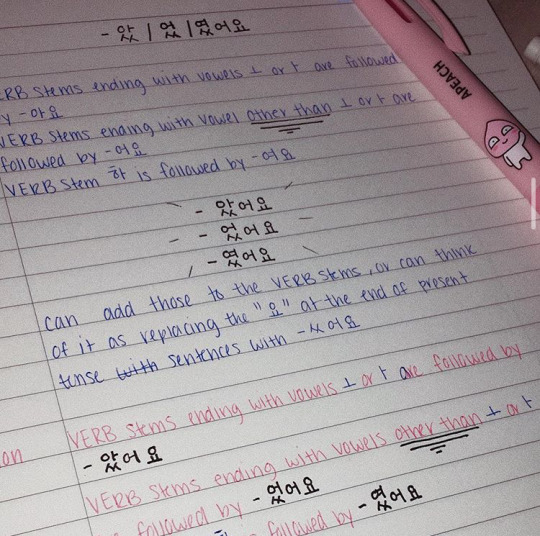
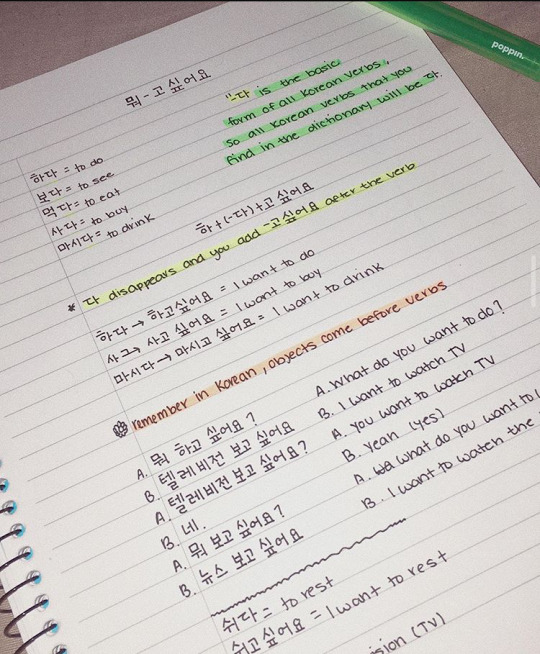
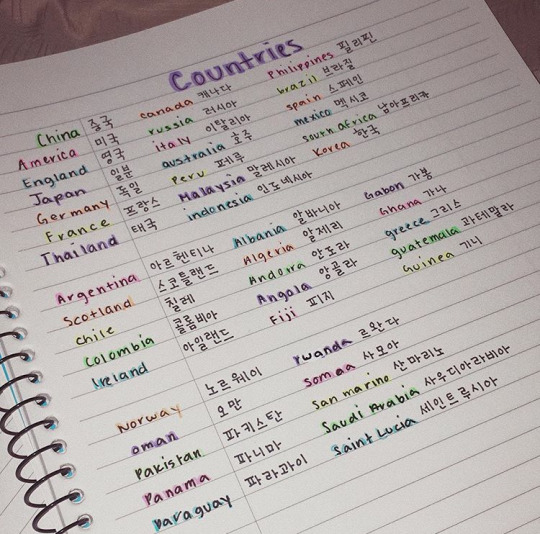
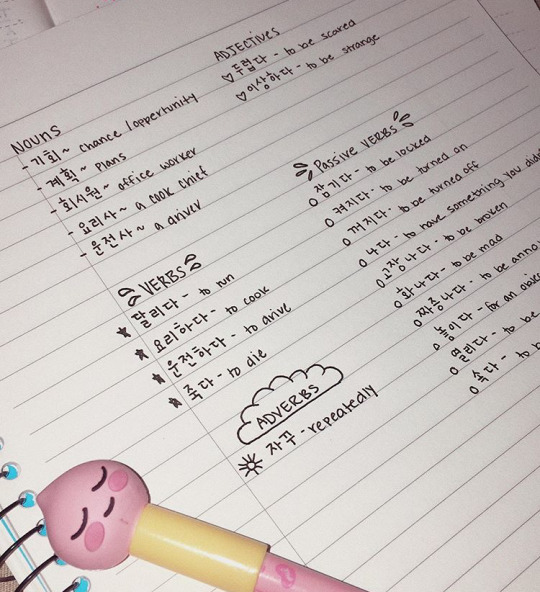
안녕하세요 여러분들 제 이름은 클라리사 이고요 한국어를 3년 공부했어요 하지만 한국어로 말할 때 아직 실수를 많이 해요 그래서 실수 했다면 죄송합니다
Hello everyone ! My name is klarissa and I’ve been learning korea 3 years now but when speaking in korean I still make a lot of mistakes so I am sorry if I make mistakes ~
#south korea#korean language#korean langblr#korean study blog#langauge#language study#한국어공부#한국어 공부하기#한국어 연습#한국어 배우기
22 notes
·
View notes
Photo
holy shit this is what i needed
adding my stuff:
☆ write me urdu (app)
☆ simply learn urdu (app)
☆ learn urdu (app)
yeah my list is stupid haha

this post is meant to be a directory of every resource I come across for Urdu. it will be a continuous work in progress so thank you for your patience! if you have any issues or things to add, please reply to this post!
info
bbc voices
glottolog
hindustani: hindi and urdu - a single language? [video]
introduction by @ayearinlanguage
“in urdu we don’t say…”
omniglot
overview of the hindi-urdu controversy
playlist of samples
wikipedia
world atlas of language structures
Keep reading
#urdu#langblr#urdu language#modern standard urdu#hindustani#اُردُو#rrdū#urdū#ctrl alt langauges#ctrl alt aesthetic#ctrl alt languages#language blog#korean language#french language#japanese language#language#korean langblr#japanese langblr#chinese langblr#langbr#langblog#langblur
129 notes
·
View notes
Text
Korean in Real Life: 역시
역시 is a word that I’ve spent a lot of time trying to work out its exact meaning. Before I moved to Korea I remember asking some of my Korean friends what it means and they had a very difficult time giving a particular definition for it. And now that I live here, and I listen to the language being spoken everyday, I understand the context of when it can be used. However a definition still eludes…
View On WordPress
#Blogger#Culture#Korean#Korean Culture#Korean Langauge#Learning Korean#Live Abroad#Living abroad#Study Korean#Teaching abroad#Travel#Travel Blog
1 note
·
View note
Photo
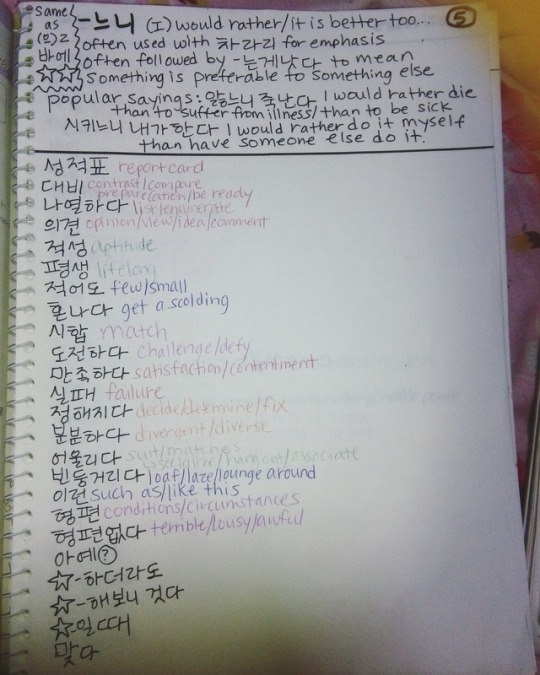
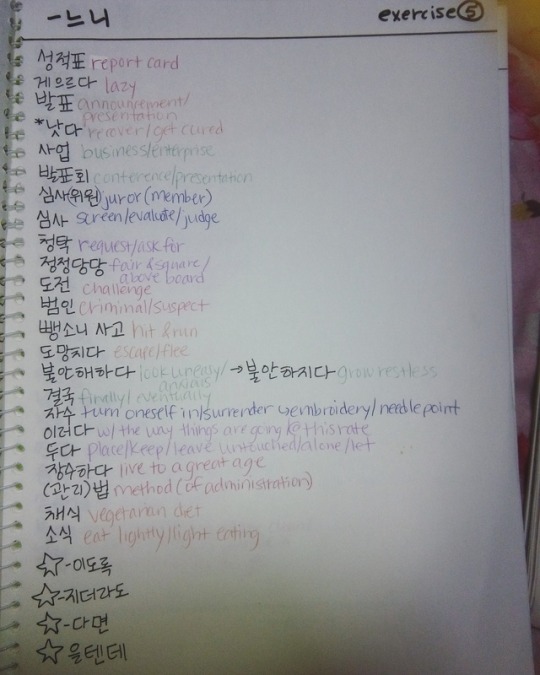
Lesson 5 from the book I am studying, the green/advanced 빈도별 토픽. It covers the grammar -느니 and means “I would prefer/It is better to..” It is often used with 차라리 for emphasis and is often followed by -는게낫다 which means something is preferable to something else
Some popular phrases using this grammar include “앓느니 죽난디” and “시키느니 내가 한다.”
I will create two sentences with this grammar and have them checked then put them here tomorrow.
#느니#느니 grammar#빈도별 토픽#토픽#TOPIK test#Korean langauge test#Korean TOPIK test#Korean TOPIK#Korean grammar#Korean vocabulary#korean vocab#learn korean#study korean#korean language blog#korean langauge#korean#study hangul#learn hangul#study hangeul#learn hangeul#TOPIK
49 notes
·
View notes
Text
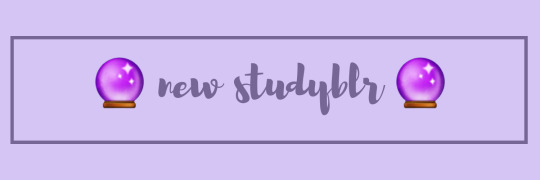
🔮 hey my name is ari!
🔮 i'm currently an upper 6 student in trinidad writing cape.
🔮 im a langauge student; i take french, spanish and environmental science [communication studies and caribbean studies are compulsory]
🔮 i'm going to study linguistics at university [i really wanna focus on sociolinguistics and creole dialectology]
🔮 native language: english, trinidad english creole
🔮 currently learning: french [b2], spanish [b2]
🔮 have been learning off and on/want to learn: portugese, mandarin, korean, patois
🔮 some of my other interests include: trying to learn more languages than i can manage, drinking copious amounts of tea, studying astrology, tarot and oracle decks, reading until ungodly hours of the morning, listening to music [i love soca, reggae, kpop, post hardcore/emo bands, dancehall, reggaeton and a few french artists], calligraphy and brush lettering
🔮 she/her | intp-t | 6w5 | cancer sun, scorpio moon aquarius rising | still can't tell if i'm more ravenclaw or slytherin
🔮 this is actually not my first studyblr. i switched accs two years ago but stopped using tumblr but i'm back now!
🔮 i hope to use this blog frequently to connect with my friends in the community [plus make some new ones as well], inspire others esp young caribbean students [i know there aren't many resources out there so i'm here to help] and just to record my progress and keep myself inspired as i move from secondary school to university [as soon as i decide where im going i'll let y'all know!]
🔮 this blog is solely aimed at spreading positivity however i may speak on social issues from time to time
🔮 that being said: this blog is a safe space! you are free to disagree with me or anything i reblog but any offensive posts or users will be removed [i.e. no racism, homophobia, transphobia, fat-shaming, classism, sexism, etc.]
🔮 please send me a msg or leave an ask if there's anything you need!
🔮 some people that inspire me:
@multilingual-wannabe // @eirlon
@studyign
@academla
@academiix
@obsidianstudy
@universi-tea
my other close friends who arent on tumblr :(
🔮 my main is @imaginari
ari ♡
#new studyblr#small studyblr#studyblr#langblr#lingblr#cxc cape#trinidad and tobago#trini studyblr#caribbean studyblr#french#spanish#astrology#music#reading#environmental science#communication studies#caribbean studies#sixth form#modern languages#university#productivity#rien es studyin#lingually#oc#heysareena#academiix#arilookatthis#studyblr intro post#ariwrotethis#cxc csec
33 notes
·
View notes
Photo

쪽 어휘 - Directions Vocab
Hello Everyone! A small lesson here that I made for my friend about cardinal directions!
Vocab (어휘): 직진 - straight 오른쪽 - right 왼쪽 - left 유턴 - U-Turn 후진 // 뒤로 - backward 맞은편 - opposite side 길 - road 제일 가까운 - nearest Cardinal Directions: 복(쪽) - North 동(쪽) - East 남(쪽) - South 서(쪽) - West 문법 - Grammar 'X' ㄹ/-을까요? - should we 'X ~ 오른쪽 갈까요? - should we go right?
Sample Sentences: 1. 화장실 어디세요? - where's the bathroom? 2. 'X'(으)로 가세요 - go 'X' 3. ‘X’ 어디 있어요? - where is ‘X’? ~ 강남역 - Gangnam station ~ 홍대 - Hongdae ~ (연세)대학교 - (Yonsei) University 4. 제일 가까운 ‘X’ 어디 있어요? - where is the nearest ‘X’? ~ 시장 / 마켓 - market ~ 병원 - hospital ~ 은행 - bank
If you’re going to Korea soon or if you’re still learning, I hope this helped! Happy Learning :)
~ SK101
#korean#korean langauge#korean langauge blog#korean langblr#klangblr#kblr#learn korean#study korean#studykorean101#sk101#korean lesson#korean vocabulary#korean sentences#korean conversation#korean direction#korean grammar#korean vocab#korean culture#korean survival#한국어#한국어 배우기#한국어 배우기 101#한국어 공부#한국어 언어#한국어 어휘#한국어 문법#쪽 어휘#쪽#한국
473 notes
·
View notes
Note
wait you speak seven /7/ languages???? ???? i might have scrolled tooo much on your blog and i saw you answered an ask... do you maybe speak korean? hope it isnt personal since you didnt want to elaborate on exact languages you speak.. i loveyour stories a lot and you became even more interesting omg HOW did you learn them?? im studying japanese and korean but its so hard!! love you!! also you dont need to answer this if you dont want too
Hi! ❤ oh >.< I dont talk about it because this blog is just for writing/kpop entertainment - I dont think people care enough about who I am, and many are fast to think I brag, etc so I just dont do it ^^
Anyways, THIS MIGHT BE LONG so watch out! Read only if you are interested about my TED talk on learning Korean (and other languages) haha 😊
I do speak Korean! I write my research papers in Korean after all so... I guess I can state that. As for the rest... well I was born into a bilingual family! And Im from a small country that is overlooked by literally everyone (I barely ever met people who know my country) so learning “the big” languages like English/German is a must - I learned both since I was very young and during my young days not much was dubbed into my native language so I had to watch it in a language of another country... If you speak English and German, you can learn quickly Norwegian - I did that with the help of my Norwegian friend!
As for Korean - its difficult when you first start, but I learned Korean within two years - Im now advanced. I have to say I was lucky since I already spoke many languages and I can refer to all of them if I dont get something in Korean! Otherwise its just your determination. Also, do NOT study for the sake of language exams (TOPIK) - unless its the only thing you need. I never did that, topik is only a paper to prove something to the administration. Unfortunately, if you want do masters/doctoral studies in Korea, you need to study other, more advanced/difficult texts than is topik.
Plus, use LingoDeer - its the best app for Asian langauges that explains sentence structure as it is in Korean, NOT the way English is structured. English has very little in common with Korean, it would be of no help to you. I dont know much about Japanese, I only understand some words thanks to Korean. But my Japanese friends were able to learn Korean fairly easily given their grammar/syntax is similar :) Frankly, only a few days ago I started learning hiragana just for fun but I dont think I will study it seriously haha.
Also, last advice - I would not study two languages at a time if you are really serious... But that is purely the way I work. I cant do it now at my age. I know I can learn a language a bit faster, so I make sure I focus on it only, and later when I feel confident, I would start the second language. But once again, that is just my opinion because I know myself >.<
I hope I helped? Good luck with studying and thank you for being interested haha! ❤❤❤❤❤❤
4 notes
·
View notes